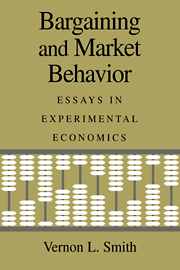Book contents
- Frontmatter
- Contents
- Preface
- Part I Economics and Psychology
- INTRODUCTION
- 1 Rational Choice: The Contrast Between Economics and Psychology
- 2 Experimental Tests of the Endowment Effect
- 3 Monetary Rewards and Decision Cost in Experimental Economics
- 4 Fairness: Effect on Temporary and Equilibrium Prices in Posted-Offer Markets
- Part II Bargaining Theory, Behavior, and Evolutionary Psychology
- Part III Institutions and Markets
- Part IV Stock Markets and Bubbles in the Laboratory
- References
- Index
3 - Monetary Rewards and Decision Cost in Experimental Economics
Published online by Cambridge University Press: 29 October 2009
- Frontmatter
- Contents
- Preface
- Part I Economics and Psychology
- INTRODUCTION
- 1 Rational Choice: The Contrast Between Economics and Psychology
- 2 Experimental Tests of the Endowment Effect
- 3 Monetary Rewards and Decision Cost in Experimental Economics
- 4 Fairness: Effect on Temporary and Equilibrium Prices in Posted-Offer Markets
- Part II Bargaining Theory, Behavior, and Evolutionary Psychology
- Part III Institutions and Markets
- Part IV Stock Markets and Bubbles in the Laboratory
- References
- Index
Summary
This chapter provides a theoretical framework and some evidence about how the size of payoffs affects outcomes in laboratory experiments.We examine theoretical issues related to the question of how payoffs can matter and what the trade-offs with nonmonetary arguments might be in individual utility functions. Essentially, we accomplish this with an effort theory of subject behavior.
Experimentalists frequently argue that experimental subjects may have other motivations besides monetary gain that impinge upon the subject's decision making and that experimental results should be interpreted with this caveat in mind. The literature on adaptive and behavioral economic modeling often cites decision-making cost as part of the implicit justification for such models. Conlisk (1988) provides some examples of how optimizing cost (we will use the term decision cost) can be explicitly integrated into modeling problems and suggests a generalization for the class of quadratic loss functions. Our approach is to formulate the decision cost problem as one of balancing the benefit against the effort cost of reducing “error,” the latter defined as the difference between optimal decision in the absence of decision cost and the agent's actual decision. This normalization has the advantage that the implications of the model can be directly tested from data on the error properties of a wide range of reported experiments. Our approach also attempts to encompass and formalize the argument that decision makers may fail to optimize because of the problem of flat maxima, as in von Winterfeldt and Edwards (1986), or because of low opportunity cost for deviations from the optimal as in Harrison (1989).
- Type
- Chapter
- Information
- Bargaining and Market BehaviorEssays in Experimental Economics, pp. 41 - 60Publisher: Cambridge University PressPrint publication year: 2000
- 2
- Cited by



